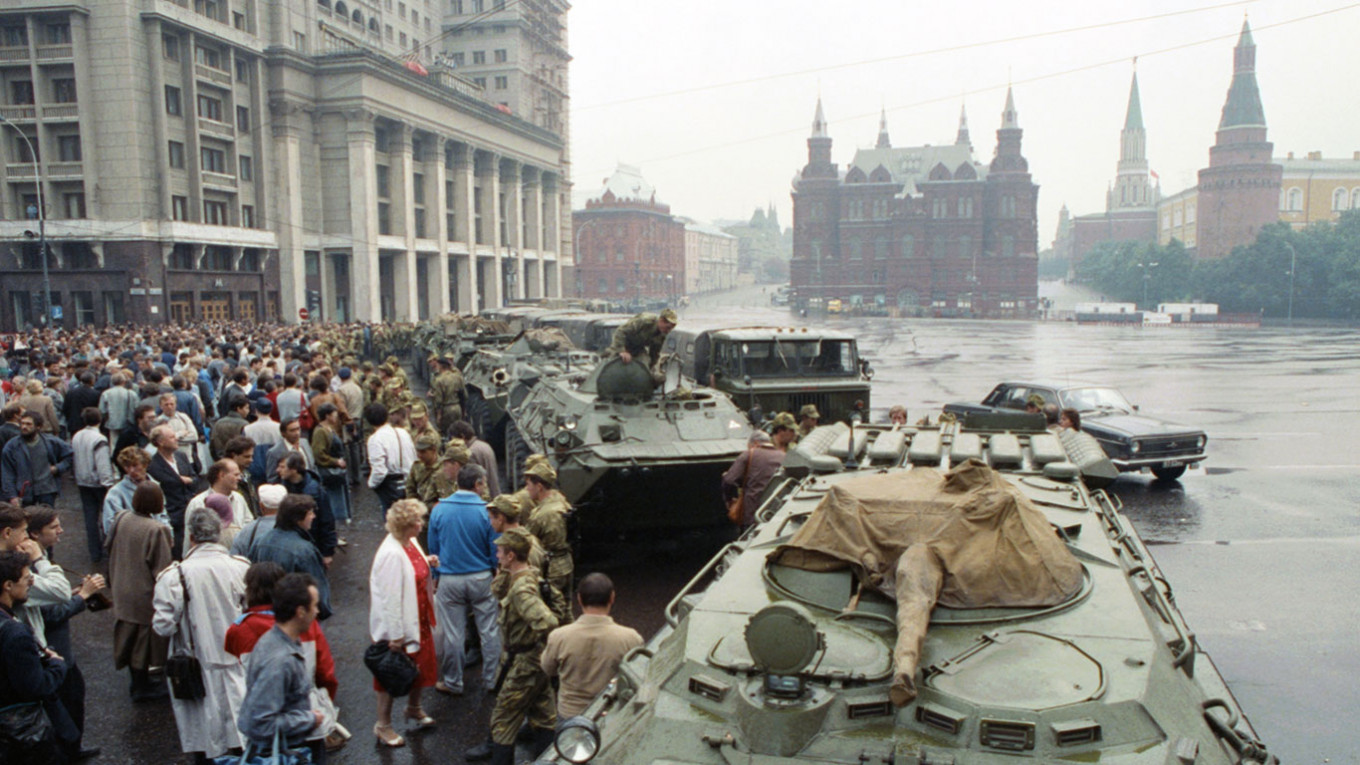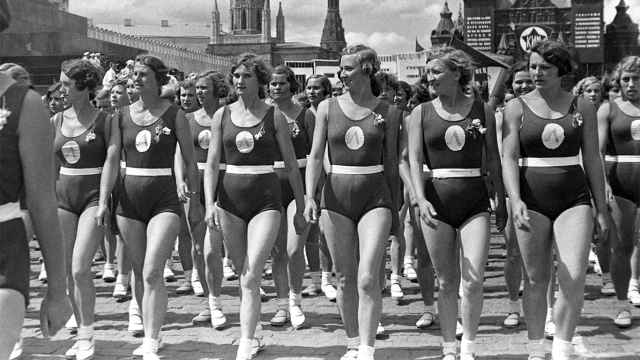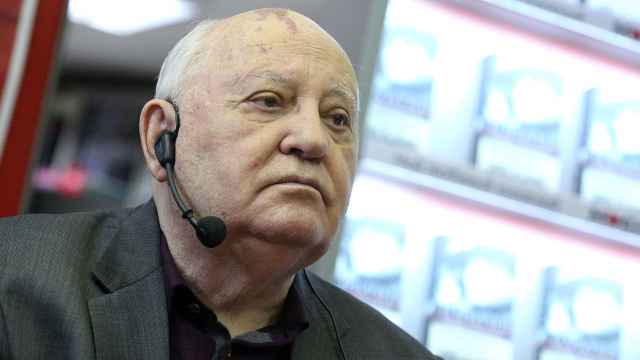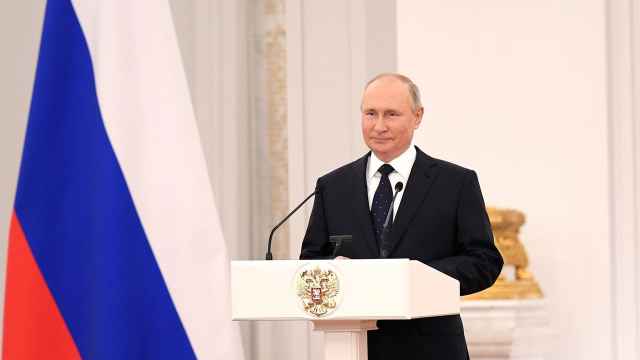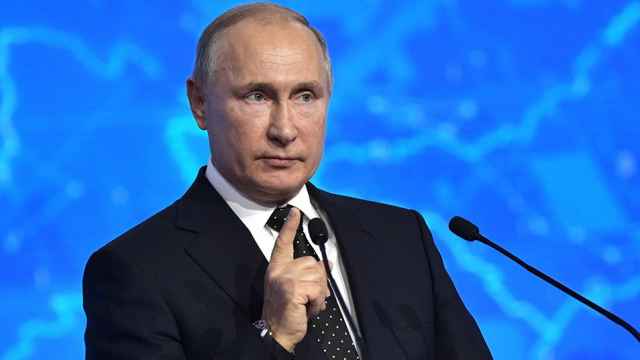In the center of Moscow, hidden behind two lanes of heaving traffic on the New Arbat commercial thoroughfare, stands a small concrete monument bearing the names of three young men killed by tanks on the night of Aug. 21, 1991, as a coup by communist hardliners to preserve the unravelling Soviet Union flamed out.
It is the Russian capital’s only memorial to the August Coup that sounded the death knell for the Soviet Union and the birth of the Russian Federation, but today is barely celebrated, even by the country’s beleaguered democrats.
“The coup was an idiotic affair, completely absurd,” said Grigory Yavlinsky, then an advisor to the Soviet government on economic reform and later a liberal politician, who joined the crowds who had rallied against the putschists on hearing of the coup.
“When it all collapsed, people were shouting ‘victory’ and’ ‘freedom.’ But it didn’t feel like that to me.”
With a recent poll by the Levada Center independent pollster showing that 66% of Russians believe that neither the coup plotters nor those who opposed them were in the right, muted reactions to the upcoming anniversary underline Russia’s deeply conflicted view of the events and the subsequent collapse of the Soviet Union, even three decades on.
For the thirtieth anniversary of the August Coup, The Moscow Times interviewed surviving participants on both sides about the legacy and significance of an event some see as a democratic revolution that birthed a new Russia, and others as a betrayal and a tragedy.
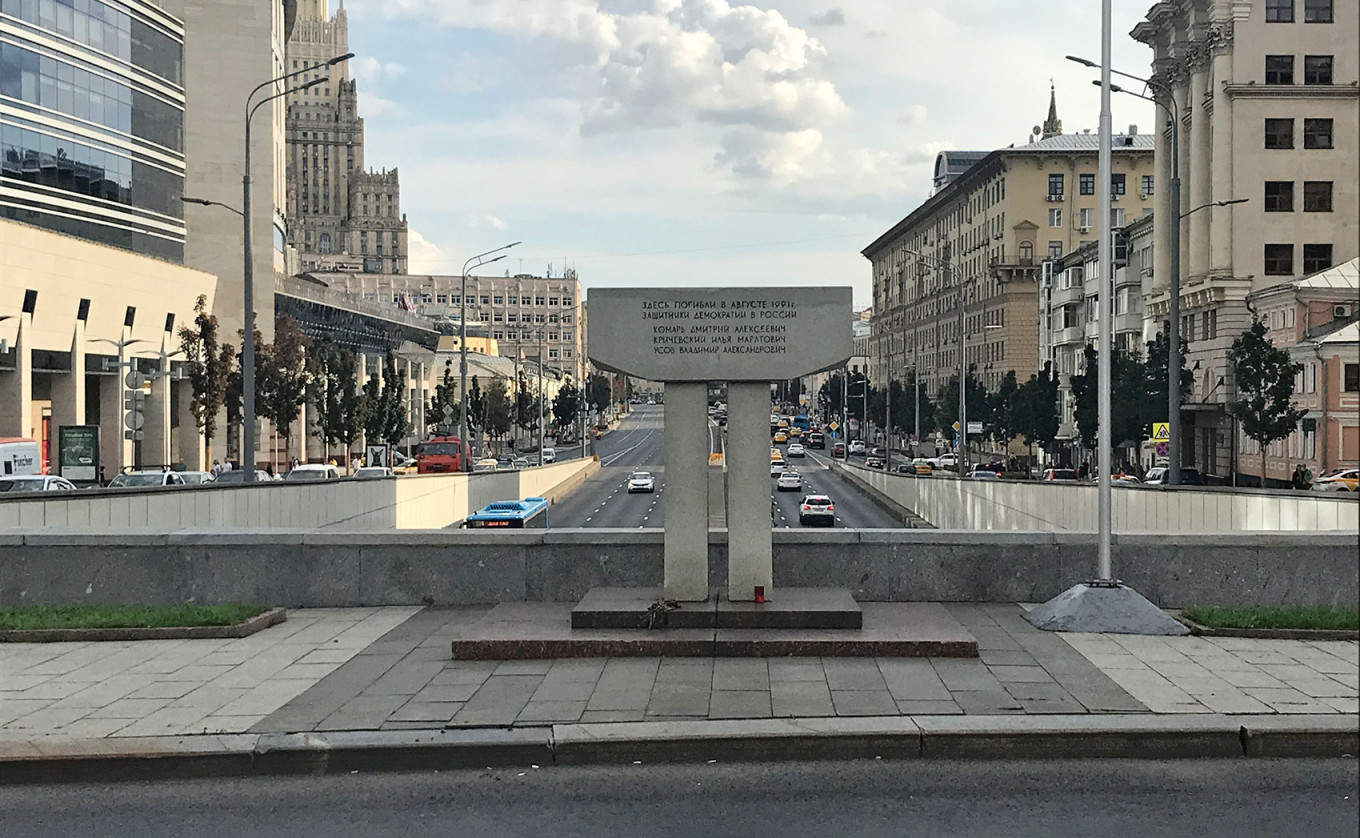
When news of the coup broke, and television stations switched programming to the recording of the ballet Swan Lake traditionally broadcast to announce a death in the country’s leadership, few were surprised.
“I didn’t know that the putsch was being planned, but I felt that something was coming,” said Alexander Prokhanov, an ultranationalist writer who earlier that summer had written an open letter widely interpreted as a call for a military takeover, and who on Aug. 18 immediately rushed to the Defense Ministry to back the coup.
“We all understood that something had to give.”
Since coming to power in 1985, Soviet leader Mikhail Gorbachev had unleashed a flurry of political, economic and social reforms that had shaken the U.S.S.R. to its foundations.
But even as Glasnost and Perestroika had sparked hitherto unknown freedoms of speech and expression as well as a new, democratically elected parliament, the reforms had seen the economy collapse and long-buried national and ethnic grievances explode into conflict, as the U.S.S.R.’s long-marginalized non-Russian republics began to assert themselves.
By summer 1991, with Gorbachev preparing to sign a new Union Treaty that would refound the U.S.S.R. as a loose confederation, hardliners in the army and KGB felt their time had come, and quietly formed the State Committee on the State of Emergency, still known by its Russian initials as the GKChP.
“The country was ungovernable,” said Vyacheslav Generalov, Gorbachev's head of security, who was ordered by the putschists to detain him at his holiday home in Crimea.
“The factories had stopped operating. No one was working. Everything was falling apart.”
But when the coup launched — with Gorbachev arrested and tanks filing through Moscow to converge on the White House, where the government of Boris Yeltsin, Russia’s reformist leader, was based — it swiftly became apparent that it had badly misfired.
With the soldiers ordered into Moscow unwilling to shed blood, and Yeltsin still at large, the coup’s leaders — who appeared visibly uncomfortable and drunk at a press conference — capitulated after three tense days. In doing so, they shattered the Soviet state’s remaining power, and the outlying republics declared independence one-by-one until the union was formally wound up in December.
“The coup leaders could never have won,” said Alexander Korzhakov, Yeltsin’s bodyguard and closest confidant in the years before and after 1991.
“They were weak, timid men. They didn’t want to kill people, and just hoped the tanks would be enough.”
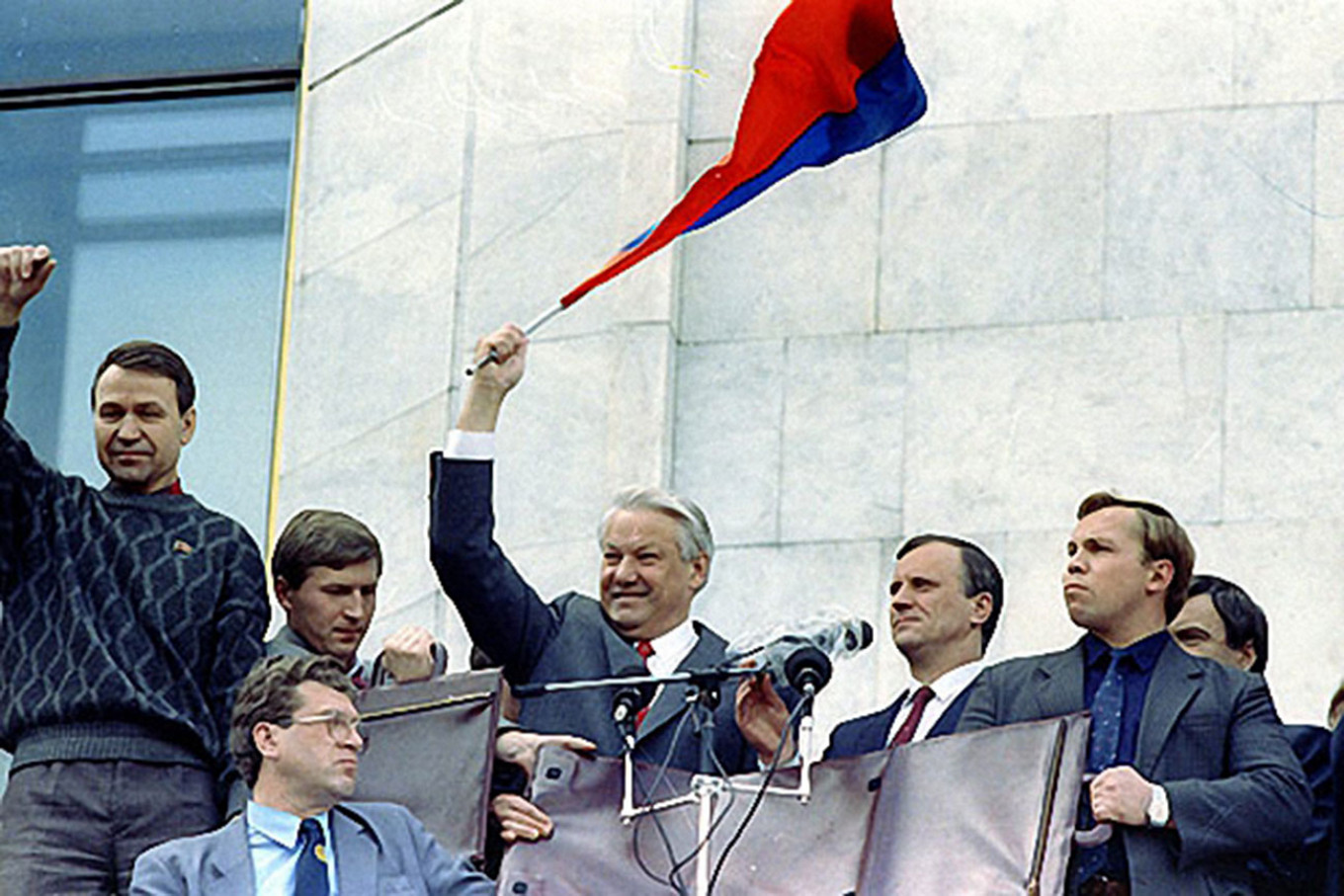
Despite their seismic consequences, there has never been much interest in commemorating the events that felled the Soviet Union.
Though Aug. 22 — the day on which the coup’s leaders capitulated — is nominally a public holiday called National Flag Day, it is not widely celebrated. In contrast to Victory Day and May Day, President Putin does not make a televised statement on the holiday, which curbs public interest.
In many ways, this makes sense. Polls suggest that most Russians regret the fall of the U.S.S.R., while the post-collapse 1990s are seen as a traumatic period of economic destitution, political turmoil and cultural upheaval, a repeat of which must be avoided at all costs.
Yet at the same time, only a small and nostalgic hardcore — 28%, according to a 2020 Levada poll — actively want to return to the Soviet Union.
It’s an ambiguous view that for some veterans of the Soviet collapse is in keeping with the legacy of a confused, chaotic coup that promised much but ultimately resolved little.
“It was all theatre,” said Vyacheslav Igrunov, a Soviet-era dissident who was active in organizing resistance to the coup in Moscow. “It wasn’t a democratic revolution so much as a mindless uprising against the system.”
“Most people on the street just went about their business and didn’t care, one way or the other.”
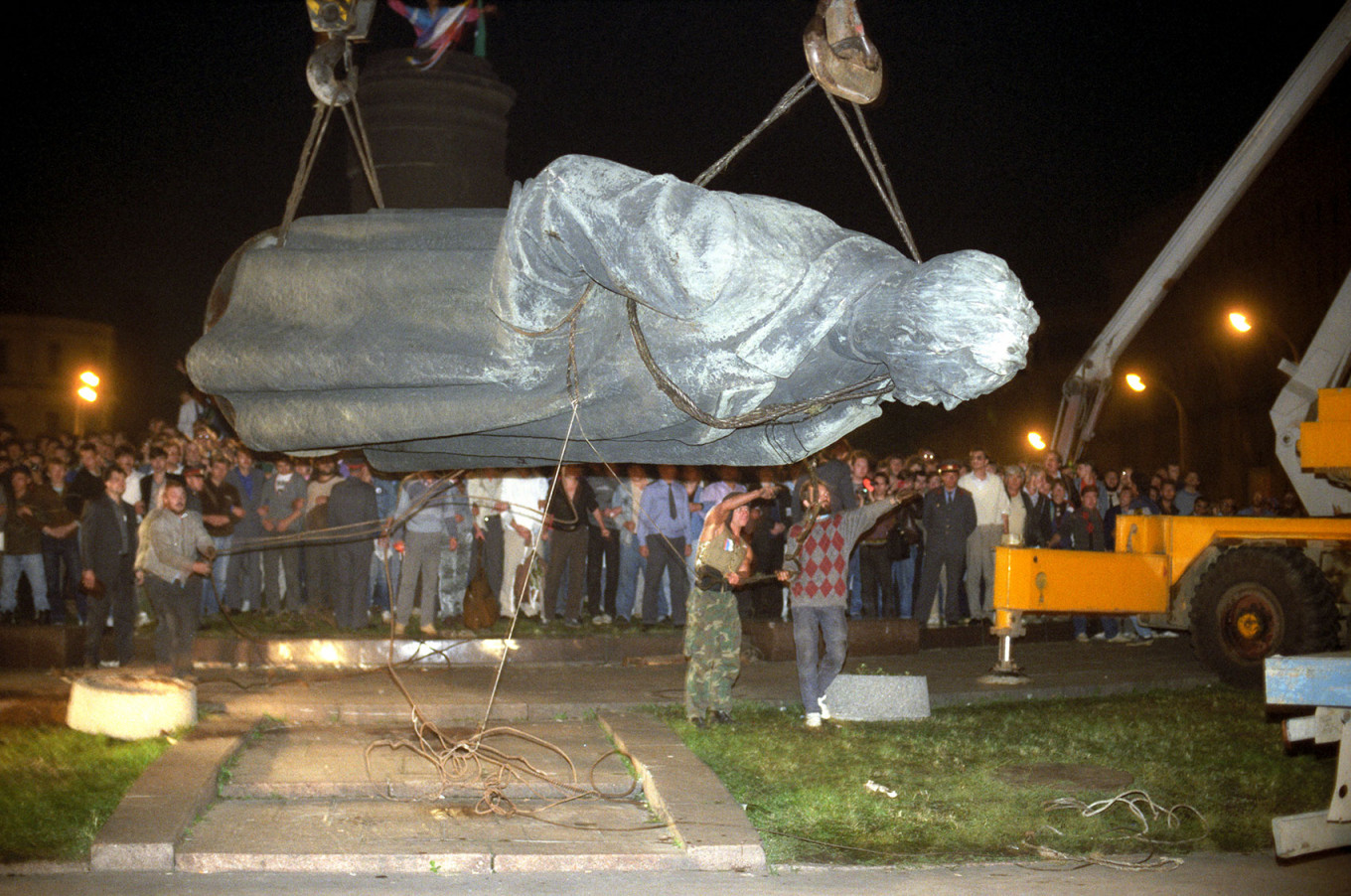
Thirty years on from the Soviet Union’s death agonies, the fruits of that August still defy easy categorization.
Though Russians now enjoy personal freedoms unthought of under Soviet socialism in a country vastly more wealthy, developed and functional than it was in 1991, the democratic rights secured after the U.S.S.R.’s collapse have been steadily rolled back under Russian President Vladimir Putin, with elections tightly choreographed and the free press more or less dismantled.
Meanwhile, a rehabilitation — albeit selective — of elements of the Soviet past has been accompanied by a gradual increase in the influence of the security services that were the driving force behind the 1991 coup, and are now widely believed to have the ear of Putin, himself a veteran of the Soviet KGB.
For many of the democrats of 1991, the Soviet collapse and the birth of the Russian Federation remains a false dawn, whose promise was squandered during the turbulent 1990s, when economic crisis and political turmoil prevented democracy from taking root in Russia.
Writing on the otherwise muted 30th anniversary of the coup, Russian and foreign observers alike have claimed that the defeated GKChP has emerged the ultimate winner in a Russia that has largely rejected the legacy of August 1991.
“Modern Russia belongs to the putschists, to the security services,” said Yavlinsky, whose once-influential political bloc Yabloko was an early victim of the rise of Putin, swept out of parliament in 2003 by an electorate who associated liberal and democrats with the failures of the 1990s.
“Because we messed up the reforms and didn’t come to terms with Stalinism, we ended up giving away our victory. It is a great shame,” he added.
Certainly, whatever democratic optimism there was in August 1991 was quick to dissipate.
As Yeltsin’s government embarked on a program of radical economic reform, hyperinflation and poverty eroded faith in new-born Russian democracy.
By October 1993, parliamentary opposition to free market reforms had mutated into a constitutional crisis, as communist and nationalist lawmakers convened in Moscow’s White House to impeach Yeltsin and replace him with vice-president Alexander Rutskoi, a former Yeltsin supporter who had played a decisive role in defeating the coup by freeing Gorbachev from his Crimean captivity.
When Yeltsin refused to resign, the stand-off was ultimately resolved with bloodshed, as the president ordered tanks to shell into submission the same building he had defended from the coup plotters barely two years before.
Reached over the messenger service WhatsApp, Rutskoi told The Moscow Times that he regrets the failure of the 1991 putsch and the collapse of the U.S.S.R., despite the critical role he played in both.
“All the members of the GKChP were driven by one righteous desire — to save the Soviet Union at any cost,” he wrote.
And yet despite Russia’s turn away from liberal democracy, many of the putsch’s losers find little to like in a Russia that has replaced Soviet socialism with a free-wheeling brand of capitalism, while failing — with the exception of the 2014 annexation of Crimea — to recoup the territorial losses of 1991.
“Today, Russia is in a very difficult position,” said Prokhanov, the ultranationalist writer, who has long been critical of Putin, who he sees as insufficiently committed to his patriotic, anti-Western vision.
“The values that animated the country in the Soviet period have been utterly destroyed. We remain lost as a nation.”
Putin — even as he has steered Russia in a nationalist, anti-Western direction over his two decades in office and famously called the collapse of the Soviet Union a “catastrophe” — has shied away from ever truly rehabilitating the 1991 plotters, or the Soviet system as a whole.
“Anyone who doesn't regret the passing of the Soviet Union has no heart,” Putin famously told a television studio audience in 2010. “Anyone who wants it restored has no brains.”
In an interview for a 2018 biographical film on the life on Anatoly Sobchak — the liberal St. Petersburg mayor for whom he worked at the time and who opposed the coup — Putin confessed to having felt torn by the unfolding coup between his loyalties to his boss, and the security services to which he had dedicated his professional life. It was only after some thought, said Putin, that he decided to submit his resignation from the KGB, and come out against the putschists.
For Sergei Stankevich — a liberal lawmaker in 1991 who as the coup collapsed was tasked with overseeing the felling of an iconic statue of Soviet secret police founder Felix Dzherzhinsky on Moscow’s Lubyanka Square — the paradox of an anti-coup president ultimately implementing elements of its agenda is the true legacy of August 1991.
“What we have now is Bonapartism,” said Stankevich, referring to the French emperor who put an end to the French Revolution while enshrining many of its accomplishments.
For Stankevich, these messy compromises of post-Soviet Russia — where political authoritarianism must coexist with far greater ideological diversity and civil society than under the Soviet Union, and free market capitalism with an overweening state — fully satisfy neither side but are still worth defending.
“The current Russia is by no means a restoration of the Soviet Union. We have a capitalist economy, though with an unfortunately weak middle class. The influence of the state and especially the security services are greater than they should be.”
Likewise, according to Stankevich, Russia’s authoritarian turn does not preclude future political reforms that might yet complete the unfinished business of 1991.
“We need some further political changes, but I think that will come with evolution,” he said.
“Eventually, a moderate reformer will inevitably emerge from within the system, like Gorbachev did.”
Trouble on the horizon
Elsewhere, however, such optimism is in short supply.
With Russia’s economy now stagnant for the best part of a decade, and political repression ramping up, many of those who opposed the GKChP see the flaws of the Soviet system recreating themselves in Putin’s Russia, and trouble on the horizon as a result.
Of those participants interviewed by the Moscow Times only one — Gorbachev's former head of security Generalov, who spent time in jail after the coup failed, before being amnestied on grounds of ill health — expressed unqualified optimism for Russia and faith in its president.
“Things are good in the country now. Our army has been restored, that’s the main thing. Our economy is much better now, compared to where it was in the nineties. It’s like night and day,” he said.
“I feel very positively about the way our leaders are handling things.”
In contrast, most now see the freedoms of the 1990s being stripped away by an increasingly authoritarian state. Some have even come to sympathize with the radical, anti-Kremlin opposition.
“I think very highly of Alexei Navalny,” said Yeltsin bodyguard and confidant Korzhakov, of the jailed Kremlin critic who has become emblematic of those Russians most opposed to Putin.
“I always fought for democracy,” said Korzhakov, who was sacked by Yeltsin in 1996 after he advocated cancelling the looming presidential elections and declaring martial law, before serving several terms in the State Duma for the pro-Putin United Russia party and writing a series of tell-all books on his time with Yeltsin.
“But it turns out it was all for nothing. Now the country is returning to the Stalinist period.”
For some of those who resisted the coup in 1991, the problem is less the reality of a creeping return to dictatorship than the prospect of a familiar pattern in Russian history recreating itself.
After Russia’s traumatic twentieth century — during which authoritarian systems faced with acute crises collapsed in 1917 and 1991 and pushed the country into all-consuming social, political and economic crisis — some worry that the present trend towards political authoritarianism will end the same way.
“We don’t know when everything will next come crashing down,” said dissident Igrunov.
“But it will. And at the moment, I don’t see how Russia will be able to escape from it.”
A Message from The Moscow Times:
Dear readers,
We are facing unprecedented challenges. Russia's Prosecutor General's Office has designated The Moscow Times as an "undesirable" organization, criminalizing our work and putting our staff at risk of prosecution. This follows our earlier unjust labeling as a "foreign agent."
These actions are direct attempts to silence independent journalism in Russia. The authorities claim our work "discredits the decisions of the Russian leadership." We see things differently: we strive to provide accurate, unbiased reporting on Russia.
We, the journalists of The Moscow Times, refuse to be silenced. But to continue our work, we need your help.
Your support, no matter how small, makes a world of difference. If you can, please support us monthly starting from just $2. It's quick to set up, and every contribution makes a significant impact.
By supporting The Moscow Times, you're defending open, independent journalism in the face of repression. Thank you for standing with us.
Remind me later.



